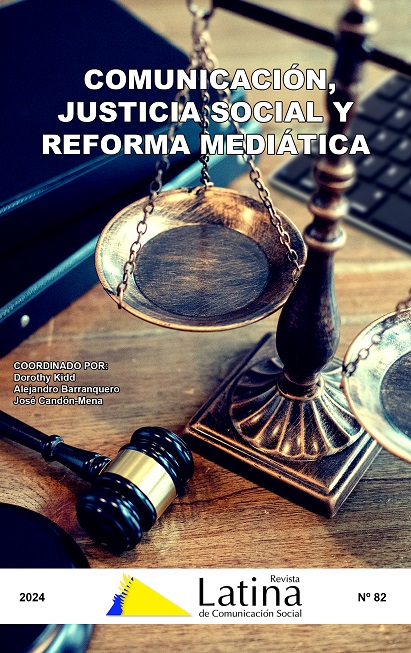The concept of Media Reform and its contributions to the processes of ecosocial and communicative justice
DOI:
https://doi.org/10.4185/rlcs-2024-2299Keywords:
Media reform, Third Sector of Communication, Community media, Educommunication, Social movements, NGO, Social responsibility.Abstract
In the current context of planetary crisis and inequality, communication and its media are strategic spaces from which to work for more just, representative and socially and ecologically responsible societies. This state of the question explores the theoretical debates and main contributions to eco-social and communicative justice of the media reform movements in different parts of the planet since the publication of historical milestones such as the Hutchins Report (1947) and the McBride Report (1980). NOTE: This monograph is part of the R&D "Sustainability of the Third Communication Sector. Design and Application of Indicators" (SOSCom) [PID2020-113011RB-I00 funded by MCIN/ AEI/ 10.13039/501100011033] and the lines of action of the Research Network on Community, Alternative and Participatory Communication (RICCAP).Downloads
References
Álvarez-Peralta, M. (2017). Demandas de reforma mediática y momento populista. La circulación de las propuestas de democratización de los medios en el espacio político post-bipartidista. IC. Revista Científica de Información y Comunicación, 14, 121-157. https://doi.org/10.12795/IC.2017.i01.05
Arévalo-Salinas, A. I. (2014). Periodismo y comunicación para la paz. Indicadores y marco regulatorio. Commons. Revista de Comunicación y Ciudadanía Digital, 3(1), 56-92. https://doi.org/10.25267/commons.2014.v3.i1.03
Barranquero, A. (2019). Comunicación, ciudadanía y cambio social. Diseño de un modelo de investigación y acción para democratizar la comunicación desde la noción de reforma mediática. Signo y Pensamiento, 38(75). https://doi.org/10.11144/Javeriana.syp38-75.cccs
Cabrera Altieri, Daniel H. (2022). El imaginario textil: una interpretación alternativa en los estudios de la comunicación. History of Media Studies, 2. https://doi.org/10.32376/d895a0ea.a490cc14
Candón-Mena, J., & Calvo, D. (2021). El legado de la cultura hacker en los movimientos y medios ciudadanos españoles. En A. Barranquero y C. Sáez (Eds.), La comunicación desde abajo. Historia, sentidos y prácticas de la comunicación alternativa en España. Barcelona: Gedisa.
Carey, J.W. (1989). “A Cultural Approach to Communication”, en Communication as Culture: Essays on Media and Society (pp. 13-36). Boston: Unwin Hyman.
Hutchins, R. (1947). Informe sobre la libertad de prensa. Universidad de Chicago.
Freedman, D., Obar, J. A., Martens, C., y McChesney, R. W. (Eds.). (2016). Strategies for Media Reform: International Perspectives. Fordham University Press.
Freedman, D. (2022). Reverse Media Policy. Challenging empires, resisting power. En J. Pedro-Carañana, E. Herrera-Huérfano, E., y J. Ochoa (Eds.). (2022). Communicative Justice in the Pluriverse: An International Dialogue. Taylor & Francis.
Hackett, R.A. y Carroll, W.K. (2006). Remaking Media: The Public Struggle to Democratize Public Communication. Routledge.
Horwitz, R.B. (1997) Broadcast reform revisited: Reverend Everett C. Parker and the “standing” case (office of communication of the United church of Christ v. Federal Communications Commission). The Communication Review, 2(3), 311-348. https://doi.org/10.1080/10714429709368562
Kaplun, G. (2007). Comunicación Comunitaria en América Latina. Buenos Aires: Anuario de Medios.
Mast, J., Coesemans, R., & Temmerman, M. (2019). Constructive journalism: Concepts, practices, and discourses. Journalism, 20(4), 492-503. https://doi.org/10.1177/1464884918770885
McBride, S. (1980). Un sólo mundo, voces múltiples. UNESCO.
Miralles, A.M. (2002). Periodismo, opinión pública y agenda ciudadana. Bogotá: Norma.
Milan, S. (2013). Social Movements and Their Technologies: Wiring social change. Hampshire, NY: Palgrave.
Nordenstreng, K., y Traber, M. (1992). Few Voices, Many Worlds: Towards a Media Reform Movement. London: WACC.
Ong, W. (2011). Oralidad y escritura. Tecnologías de la palabra. Trad. de Angélica Scherp. México: Fondo de Cultura Económica.
Pedro-Carañana, J., y Garcés, L. A. (2023). Mind management 2.0: The internet and the myth of individualism and personal choice in neoliberal times. Teknokultura: Revista de Cultura Digital y Movimientos Sociales, 20(1), 109-116.
Pedro-Carañana, J., Herrera-Huérfano, E., y Ochoa, J. (Eds.). (2022). Communicative Justice in the Pluriverse: An International Dialogue. Taylor & Francis.
Stein, L, Kidd, D. y Rodriguez, C. (eds.) (2009) Making Our Media: Global Initiatives Toward a Democratic Public Sphere. Volume Two: National and Global Movements for Democratic Communication. Creskill, NJ: Hampton Press.
Tucho, F. (2011). La sociedad civil ante el sistema mediático. El movimiento de reforma de los medios en Estados Unidos. ZER: Revista De Estudios De Comunicación, 11(20). https://doi.org/10.1387/zer.3768

Downloads
Published
How to Cite
Issue
Section
License

This work is licensed under a Creative Commons Attribution-NonCommercial-NoDerivatives 4.0 International License.








